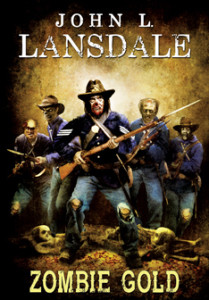 The blurb on the back cover of John L. Lansdale’s Zombie Gold comes from a movie personality, and it’s easy to see why. Stripped to its bare bones, this story of a couple of well-meaning Pennsylvania cowboys – Will and Chris, largely interchangeable – who accidentally stumble through time to the Battle of Gettysburg and get mixed up with some gold-stealing zombies along the way sounds like a fun high-concept pitch. Give it visuals, add some cinematic panache, and it could be a great popcorn flick if handled right.
The blurb on the back cover of John L. Lansdale’s Zombie Gold comes from a movie personality, and it’s easy to see why. Stripped to its bare bones, this story of a couple of well-meaning Pennsylvania cowboys – Will and Chris, largely interchangeable – who accidentally stumble through time to the Battle of Gettysburg and get mixed up with some gold-stealing zombies along the way sounds like a fun high-concept pitch. Give it visuals, add some cinematic panache, and it could be a great popcorn flick if handled right.
Unfortunately, it’s a book, not a movie pitch, and as a book, it doesn’t work.
Lansdale’s style is the worst offender here. It’s straightforward to the point of being numbing, hammering out plot points and dialogue with equally ungraceful determination. The plot moves forward with grim, plodding determination, with nary a twist to be found. The characters all say exactly what they’re thinking, using eerily similar phrasing and diction, and ninety percent of the dialogue is flat out exposition. The description is largely nonexistent, with Lansdale relying largely on reader knowledge of what elements like Civil War uniforms looked like.
And then there’s the zombies. It’s not spoiling the plot too much to say that there are indeed zombies – they’re right there in the title, after all – and that they are the cursed remains of a bunch of Union Army deserters who stole some gold and got stuck magically (and carnivorously) crosswise in time as a result. But again, Lansdale is simply sloppy with his antagonists. There’s nothing unique or interesting about these walking dead, except for the fact that the leader’s got a bit of a mouth on him, and so he outsources their behaviors, characteristics, etc. to popular culture. The worst part is, he does it for the characters as well as for the reader. At one point during the underwhelming final fight scene, one of the heroes’ buddies gets bitten. They immediately shoot him, and when another character protests, the rebuttal is essentially “Come on, man, you know what happens to someone who gets bitten by a zombie.” At which point, nothing more is said, and everyone keeps going. There’s no moral ambiguity, no debate, no discussion, just a stolid acceptance of what The Walking Dead has taught us and then we move on.
And that’s the third thing. The book is utterly without tension. One of the heroes does something dumb for no good reason, he’s punished for it, he and the other hero have an adventure, and they get back without a scratch despite basically doing nothing to actively help themselves get home. A few minor characters die along the way, there’s some historical tourism, and they acquire a puppy. And along with that comes a pile of wasted possibilities. There’s no tension over whether one of the cowboys will decide to stay back in 1863 – the possibility gets mentioned and then dropped. There’s no tension from one of the heroes meeting his direct ancestor, a Civil War hero, and finding he’s not quite the man family legend says he was. There’s no romantic tension, despite the presence of multiple possible love interests. And there’s no tension as to whether or not Will and Chris are going to get back to the modern day because they literally have no plan that can fail and thus strand them in the pass, and there’s no tension to the final fight scene because it’s sketched out in such loose terms that it feels like it’s unfinished. At no point do Will and Chris actually feel like they’re in danger, and at no point do they have to do anything other than use their modern weapons and their aw-shucks manners to get them through the worst 1863 has to offer.
Ultimately, this isn’t a book, it’s an outline with some dialogue. In another medium – Lansdale’s done extensive work in comics, for example – where visuals and performances can carry part of the storytelling load, it might be something. As it stands, it’s short yet dull, and a deep disappointment to anyone hoping it would live up the panache of its concept.
(SST Publications, 2016)
